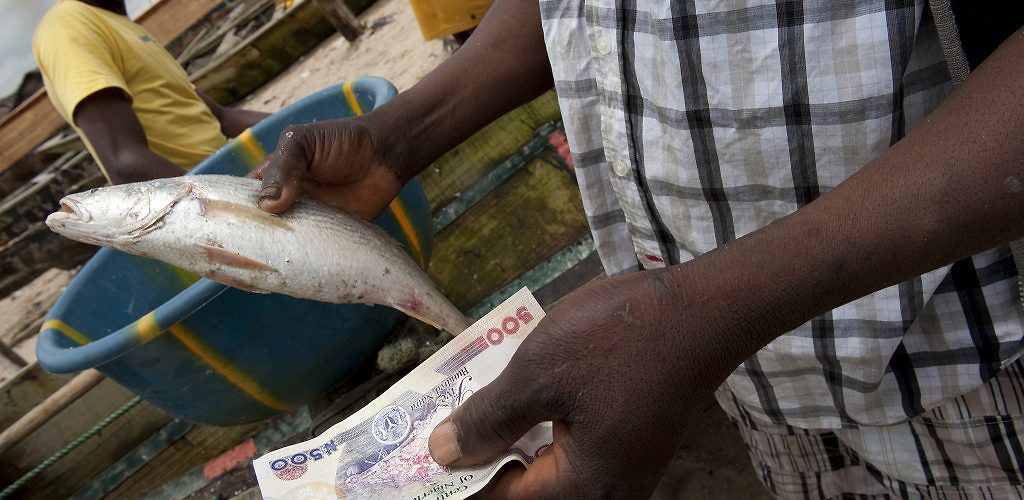A merchant sells freshly caught fish in a small village in Nigeria. Orimedu, Nigeria, September 15, 2010. ( Arne Hoel /World Bank)
The global collapse of oil prices—now tracking at 12-year lows—has thrown the budgets of resource-dependent countries on several continents into disarray. In Nigeria, the government’s overwhelming dependence on petroleum revenue has been coupled with the expensive and time-consuming fight against the Boko Haram insurgency in the country’s north. The result has been a projected budgetary shortfall of more than $11 billion USD this year, as well as continued depreciation of the national currency, the Naira.
The Washington, DC-based international financial institutions, most notably the World Bank, have expressed a willingness to provide loans at concessionary rates, to prevent collapse in Africa’s largest economy and most populous country. In the mid-1980s, when oil prices also dropped dramatically, these same institutions provided Nigeria assistance in return for implementing sweeping economic liberalization reforms. The resulting Structural Adjustment Program (SAP) notably gutted government control over the nation’s agricultural sector, in an attempt at fostering economic diversification. However, a predicted windfall of private investment never eventuated, and the sector and overall economy remained stunted.
While the level to which Nigerian authorities were complicit in the failure of the SAP continues to be debated, the latest crisis provides an opportunity for the World Bank to redeem itself in the eyes of many, by working with authorities to facilitate sustainable broad-based growth in the country. Historically low oil prices obviously present a challenge to a country that derives more than 70% of revenue from oil, but there could also now be an opportunity for Nigeria to achieve its long-sought and much-needed goals. Many Nigerian politicians, including former president Goodluck Jonathan, have in the past engaged in high-minded rhetoric regarding the need for change, but serious investment in the sector and the infrastructure projects that would empower such production has long lacked, particularly in comparison with petroleum sector development.
Short-sightedness aside, with the price of crude oil below $30 USD a barrel the administration of Muhammadu Buhari could seize the opportunity to hit reset on the economy, investing aggressively in agricultural modernization, and allowing the sector to reclaim some of its historical importance. An increase in the use of fertilizer, greater mechanization, and the establishment of processing plants for turning raw materials into higher value products would all be huge improvements.
All of these changes will require significant government planning and buy-in, however, in addition to international finance and logistical and technical support. The development of more robust local economies might also help inoculate against Boko Haram’s employment-based recruitment strategies. Tales of young boys being incorporated into the movement through the offer of $5-10 USD to undertake errands underline the importance of creating alternative economic pathways.
While Nigeria is now the largest oil producer in sub-Saharan Africa, prior to the mid-1970s its economic profile was largely agrarian. In terms of its contribution to gross domestic product, oil rose from just 6% in 1970, to more than 48% in 2004. Over the same period, agriculture’s contribution fell from 41% to 16%. Combined with rapid population growth, this diminished focus on farming has contributed to Nigeria becoming the world’s largest importer of rice.
Despite agriculture taking a backseat to petroleum in recent decades, Nigeria has significant potential for increased development in this area. The country already has a remarkable diversity of agricultural production. The commodities it produces include cotton, animal products, groundnuts, and sesame in the North and Middle Belt states; cocoa in the South-West; and rubber and palm oil in the South-East and South-South. The diversity of products could help hedge against low or volatile prices for any one commodity.
Nigerian agriculture is in turn characterized by small-holder farming. Though this presents challenges in terms of disseminating technology and achieving economies of scale, it also means that increased investment would help to distribute wealth and employment to a broad population base—70% of Nigerians are estimated to be subsistence farmers to some degree.
A central challenge to overcome is low productivity. According to a World Bank study conducted in 2010, this is a result of a poor adoption rates of modern technologies, including use of improved seed varieties and irrigation. Weak human resource and skills bases were also identified as limiting factors. Internationally backed investment in improving access to, and information about, agricultural technology is clearly needed.
Levels of investment in Nigerian agriculture must not also increase in volume, but in targeting. Exporting raw materials is significantly less profitable than exporting refined or processed materials, and Nigeria has little value-adding capacity of this nature. For example, though it produces large volumes of tomatoes, and even exports small amounts of them, it does not have the processing plants necessary to produce tomato paste, meaning its consumers must import it at significant expense.
The intent to rectify Nigeria’s economic imbalance has long been present. During his time as national agriculture and rural development minister, Akinwumi Adesina, current head of the African Development Bank noted that the country is the largest producer of cassava in the world, but expressed a desire to ” become the largest processor of cassava as well.” He highlighted opportunities for using the crop to produce starch, cassava chips for export to China, and cassava flour to replace some of the wheat flour Nigeria currently imports.
Despite the current challenges to its economy, Nigeria has made considerable gains in governance in recent years, particularly with the peaceful transition to Buhari’s government following last year’s election. The former military dictator has, in the space of 30 years, remade himself as a “reformed democrat,” offering hope that meaningful progress is entirely possible in the country. Moves to pursue an economic future not entirely pegged to the oil price must be the next step, with agricultural reform critical to the fortunes of the majority of Nigerians.
Hilary Matfess is a researcher at the Center for Complex Operations at the National Defense University, Washington, DC.





